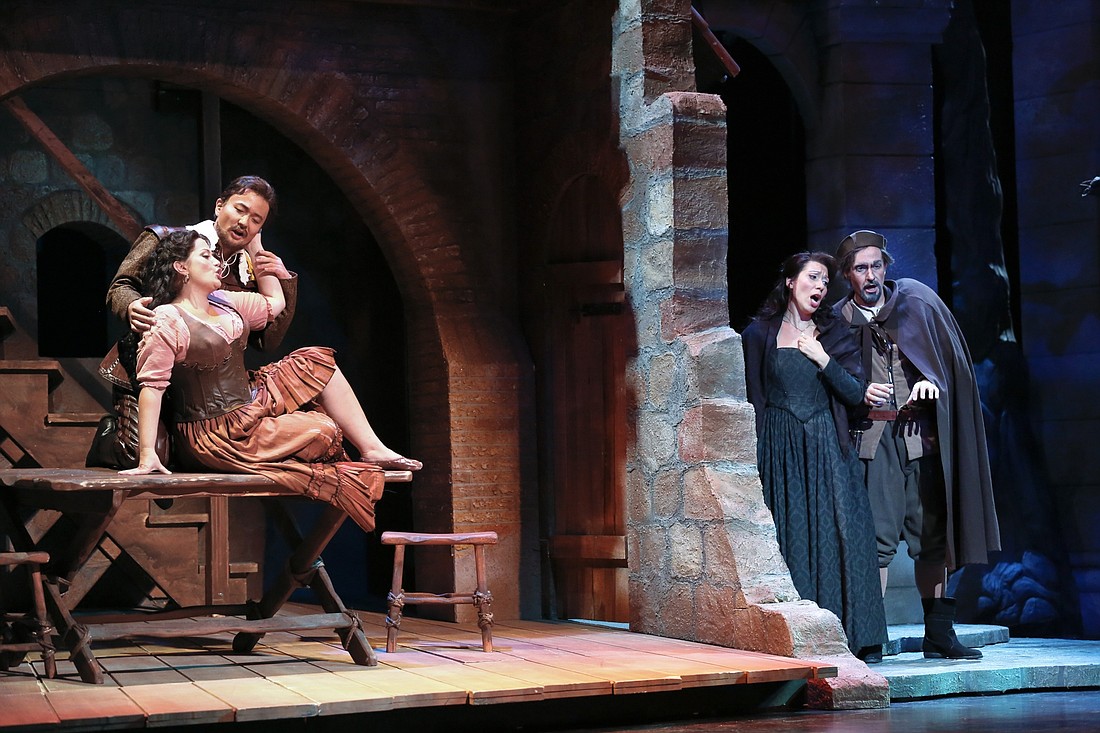- May 9, 2025
-
-
Loading

Loading

In 1989, Maestro Victor DeRenzi had just completed a Sarasota Opera production of “Rigoletto,” one of the most popular and beloved operas by Italian composer Giuseppe Verdi.
Audiences were hungry for more from the composer, so DeRenzi tested them: He followed it up with “Aroldo” — one of Verdi’s most obscure and least performed pieces.
Written in 1857 and scarcely performed in America for nearly a century, the rare opera was a gutsy choice for a conservative Sarasota audience.
But on opening night, at the end of the first act, the audience gave the company a standing ovation.
It was a reaction that would spark a decades-long tribute to Verdi’s music and storytelling. Over the course of the last 28 years, DeRenzi and the Sarasota Opera have performed every one of the Italian master’s 36 works.
When the winter opera season ends in March, and the Verdi cycle is complete, Sarasota Opera will be the only company in the history of opera to perform the entire works of a single composer.
On a breezy October afternoon, DeRenzi is overseeing early rehearsals for Giacomo Puccini’s “La bohème.”
One of the world’s most popular operas, the production will open this year’s opera season with a roar. It will be the 80th time DeRenzi has conducted the opera, but he’s always had an eye for detail; he and his wife and stage director, Stephanie Sundine, walk through each scene as if for the first time.
Before the Verdi Cycle began, popular works like “La bohème” and classic opera’s similar mainstream works could have potentially defined Sarasota Opera’s programming. But after the audience’s unexpected reaction to “Aroldo” in 1990, DeRenzi realized Sarasota audiences were hungry for something unique.
Richard Russell, now the Sarasota Opera’s executive director, sang in the opera for four seasons. He was a cast member in the seminal production and says he remembers the impact of the standing ovation.
“It was a work that’s not done very often,” he says. “The audience responded in such an amazing way that Maestro DeRenzi thought he could do all the works of Verdi, and that the audience would respond to something other than the favorite operas.”
DeRenzi says he realized the potential impact Verdi’s work could have on the opera and on Sarasota as a whole.
“If you suddenly had no Verdi, you’d take the guts out of opera around the world,” he says. “It has brought people here, sometimes as tourists, and sometimes as opera lovers. Many of them have stayed in Sarasota and helped build this community.”
The past 28 years spent producing the Verdi cycle have been a monument of determination, but to DeRenzi, it’s about more than just performing all of Verdi’s operas. The soul of the enterprise lies in creating the highest quality musical performance for each production.
The process starts with a table-read of each opera’s libretto — a rare practice in the fast-paced world of professional opera. The reads help the conductor, director and cast absorb the opera’s story and fully understand the characters and their Italian dialog.
Armed with this knowledge, DeRenzi and his carefully casted company of singers then tackle Verdi’s iconic music and melodies.
“One of the good things about Sarasota is that there is enough rehearsal time,” says Marco Nisticó, who will be performing the role of Amonasaro in “Aida.” “The music is rehearsed much longer here, and many days, the music is very carefully prepared. We work on the details.”
Nisticó performed the first Verdi role of his career in the opera’s 2008 production of “I due Foscari.” He returned for productions of “La traviata” in 2009, “Giovanna d’Arco” in 2010, “Rigoletto” in 2012 and “Don Carlos” earlier this year.
This attention to detail is part of what keeps singers coming back to Sarasota. In the Verdi cycle’s finale year, 12 singers are returning to continue their relationship with Verdi and the place that has become a second home.
“It’s a huge honor to be invited back for the final season,” says Todd Thomas, who is performing in his fifth Verdi production in this year’s “The Battle of Legnano.” “Victor has been my leading mentor in the development of my life and career.”
Since it began, the Sarasota Opera’s Verdi Cycle has impacted hundreds of performers and thousands of audience members.
“I don’t think anyone is going to be able to replicate something like the Verdi Cycle,” says Russell. “That’s something we can carry proudly into the future.”
The magnitude of the project is clear; just being around the opera house, there’s an unmistakable feeling of importance.
For the final week of the cycle, March 13 through 20, an entire Verdi Conference, representatives of the Italian government and even some of Verdi’s descendants will travel to Sarasota to see the culmination of nearly three decades of work.
After the season, the opera will take a break from Verdi. And even though the composer won’t occupy as much space in the season calendar, DeRenzi says the Italian master will always have a home in Sarasota.
“I think Verdi has created a whole new generation of opera lovers in Sarasota,” he says. “The good thing is that Verdi will always be around. Popular art is disposable, but great art is permanent.”